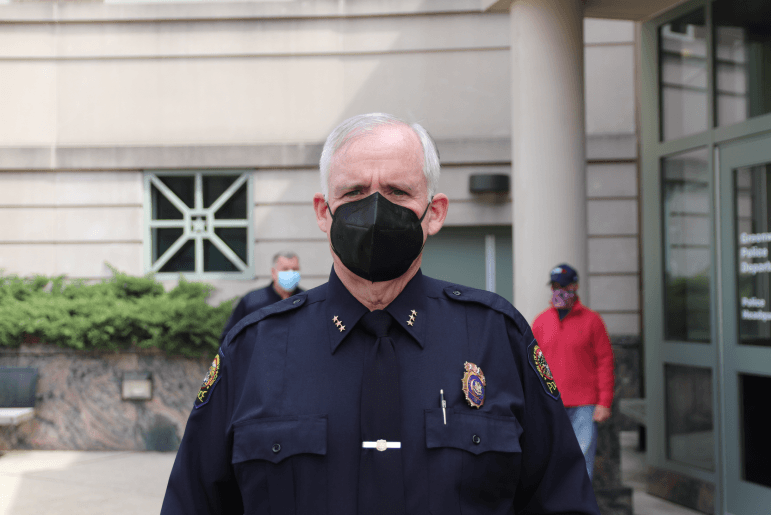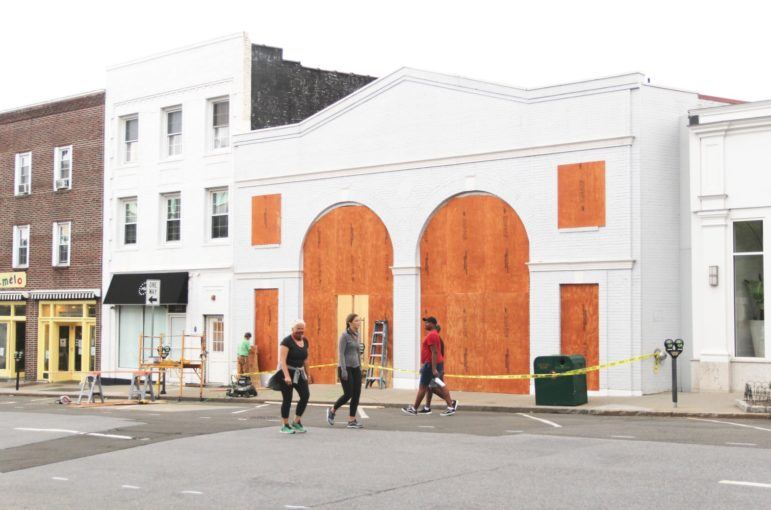The League of Women Voters held a “brown bag lunch” on Zoom with Greenwich Police Chief James Heavey as the featured speaker on Tuesday. Moderators Jennifer Dayton and Sandy Waters relayed several questions from attendees.
Heavey said Greenwich is unique from a police perspective in that 154 officers patrol 50 square miles of terrain and the harbor with a marine division. He said the force is about 16% minority officers and 10% female. Almost all Greenwich Police officers are also EMTs and a high percentage have bachelors degrees. The requirement is for a minimum of an associate’s degree or military service.
Heavey said police engage with the Greenwich community with an eye toward prevention.”One example of that is we are the first responders for medical calls. Every time GEMS is dispatched, a police officer is usually there ahead of them…It’s not all about locking people up, though we do that.”

Asked about the traits the department seeks in new officers, Heavey listed patience, understanding, and empathy. He said they also look for applicants to have done some volunteer work.
With issues of social justice in headlines across the nation, Sandy Waters asked Chief Heavey his views on the relationship between his department and the community.
“Have there been many complaints issued against the police department recently?” She asked.
“Fortunately for us we have a pretty good relationship with the community, but you can continue to nurture it and work on it,” he said. “We were abhorred to watch that on video,” he said of George Floyd’s death. “We do everything we can with good training, selection of officers and supervision – and we reinforce it on a regular basis.”
At Greenwich Police, the internal affairs section is called ‘Professional Standards,’ and it is run by Deputy Chief Mark Marino.
Civilian complaints can be submitted by phone or email. There is also a complaint form citizens can get at police headquarters or at Greenwich Town Hall.
Heavey said all complaints, even anonymous ones, are looked into.
“Most often, discipline will include retraining,” he said. “Sometimes officers don’t meet our standards, and we sometimes ask them to pursue another career.”
Heavey said the police union, the Silver Shield, represents officers below the rank of captain.
“They are a unique organization that have been around since the 1950s and are not affiliated with a national organization,” he said, adding that Lt Pannone is the current president.
The union also sponsors programs in the community, including the Police Explorers and the Bicycles for B’s program. They also run an annual golf tournament to raise funds for college scholarships for children of officers.
“Overall we have a positive relationship with them (the union),” he said. “Sometimes we are on different wavelengths as far as wages and benefits, but overall they make sure we follow the process that’s in their contract.”
Heavey said there was nothing in the contract with the Silver Shield that would prevent an officer from being disciplined. The union provides representation if an officer is investigated or arrested to assure there he or she gets benefits from process, possibly in both a criminal investigation and an internal affairs investigation.
As for the recent protests in Greenwich following the death of George Floyd, Heavey said when police learn about a protest, they coordinate with organizers.
In the event of the GHS march last Monday, he said, “We assisted them to get down to Greenwich Point and back safely.”
As for last Monday’s rally outside Greenwich Police headquarters, Heavey said it remained peaceful and police spoke to protesters.

“Unfortunately some of the local businesses boarded up their businesses, but so far everything has been good,” he said. “I’ve noticed that most of the people in these groups have been from Greenwich and there are a lot of young people.”
We do sometimes get people who try to stir up a crowd.We have to protect the protesters and identify any agitators who might have infiltrated who might want to cause harm and hurt protesters or police,” he said. “We have to look at the best ways to keep people safe. In years past we’ve had protesters show up to protest the protesters. We identify the leaders so they can do all the lawful things protected by the First Amendment and respect each other.”
Asked about policing the town during the pandemic, Heavey said fortunately one one officer has tested positive, and has recovered.
He noted that a number of officers have had to shave their beards so their face masks would fit.
“Crime and accidents have gone down because traffic went down,” Heavey said, adding that they used the freed up time for training. They also assigned officers to Greenwich Point to make sure people comply with social distancing.
As for car thefts in Greenwich, Heavey said all too often people leave their keys in their unlocked cars. He said last year Greenwich was named the safest city in Connecticut.
“This year we are number seven,” he said. “You know why? Because so many cars left Greenwich that weren’t being driven by their owners.”
Heavey said the police department’s budget was been reduced for 20-21.
He said 96% of the police dept budget, which will be about $22 million in 20-21, goes to payroll, and almost all of the members are in the union and will receive a collective bargaining salary increase of 2.05%.
He said the department took an “additional haircut” of $367,471. “That’s about three officers – salaries, benefits and equipment,” he said adding that he had also hoped to order body cameras but that won’t be possible with the budget tightening.
Heavey said last year there were 1,300 traffic accidents, though officers are not judged for the number of tickets they issue.
Last year 4,600 tickets and 2,500 warning tickets were issued.
“The more tickets we give, the less accidents there are….the less accidents, the less injuries, the less fatals. We don’t just go hide where there is an easy place to give out a ticket. We look at where there are accidents or speeding is reported.”
He said the Anti Defamation League come to the police department and done extensive training at GPD. Also, there is annual training in de-escalation and use of non lethal weapons.
“If anyone has been treated unfairly by police, we would investigate that,” Heavey said, adding, “We don’t allow choke holds and there is a duty among officers to intervene. We’ve banned shooting at a moving vehicle, with the exception of ramming or if the person is shooting from a moving vehicle.”
As for the movement to “defund police” in Minneapolis, for example, Heavey said,”Defunding is perhaps moving resources from the police budget to social services requirements.”
Chief Heavey was asked how police determine which arrests appear in the news media, and whether people can pay to keep their arrests from being published.
Heavey explained that news media come to Greenwich Police station twice a week, look through the run sheets and ask questions, but it is the media who decide what they publish.
“I have heard of people calling us to ask if we can keep their husband’s DUI out of the paper or their son’s infraction,” he said.
(In addition to the twice weekly briefings for media, the public information officer at GPD emails arrest reports to the media. When the charge is a felony, a mug shot is attached. At GFP we publish every felony arrest and accompanying mug shot.)
Asked the process for removing an officer, Heavey said there is “progressive discipline,” but an officer who commits a serious act can be fired.
He said that in the course of being chief for nine years, he had fired someone and the labor board had made him hire the person.
“I’ve also recommended a termination to the First Selectman that was overturned and reduced to a suspension,” he said. “I think there is a fair process for the officer involved. It is also a process that is stringent enough to protect the community from an officer who might not be following the rules.”
Asked if students of color are arrested at a higher rate at Greenwich High School, Heavey said that was not true. He said a few years ago there was a statistic that suggested a high number of Hispanic arrests, but that year there was one particular student who was arrested several times.
He said that now there are two SROs at the high school there are actually fewer arrests.
Asked how often force is required to enforce the law, Heavey said a ‘use of force’ is technically almost anything more than police presence, but that use of force is rare,with less than a dozen reports of use of force a year. Each use of force incident is investigated.
He said during an arrest most people are cooperative. He said Greenwich Police seldom use pepper spray and use the taser maybe twice a year.
“A Greenwich police officer hasn’t had to take a human life in the course of their duties since 1976. I think that demonstrates that training, discipline and supervision are positive things.”
Asked about rules for police voicing their personal politics on social media, Heavey said officers have to make sure they are not representing the police department when they post.
“They have the right as citizens, but have the responsibility (as officers) to be neutral,” he said. “Somebody might have a strong political view and they’re a police officer. A disadvantage of that is someone of the other party or belief now feels disenfranchised that officer or agency might not respond to their concerns in equal fashion.”
“I have to be ‘Switzerland.’ I don’t take a side politically,” Heavey said. “I try to support rule of law and community interests. Officers have to be careful about having their opinion assumed to be them as an officer or part of their agency.”